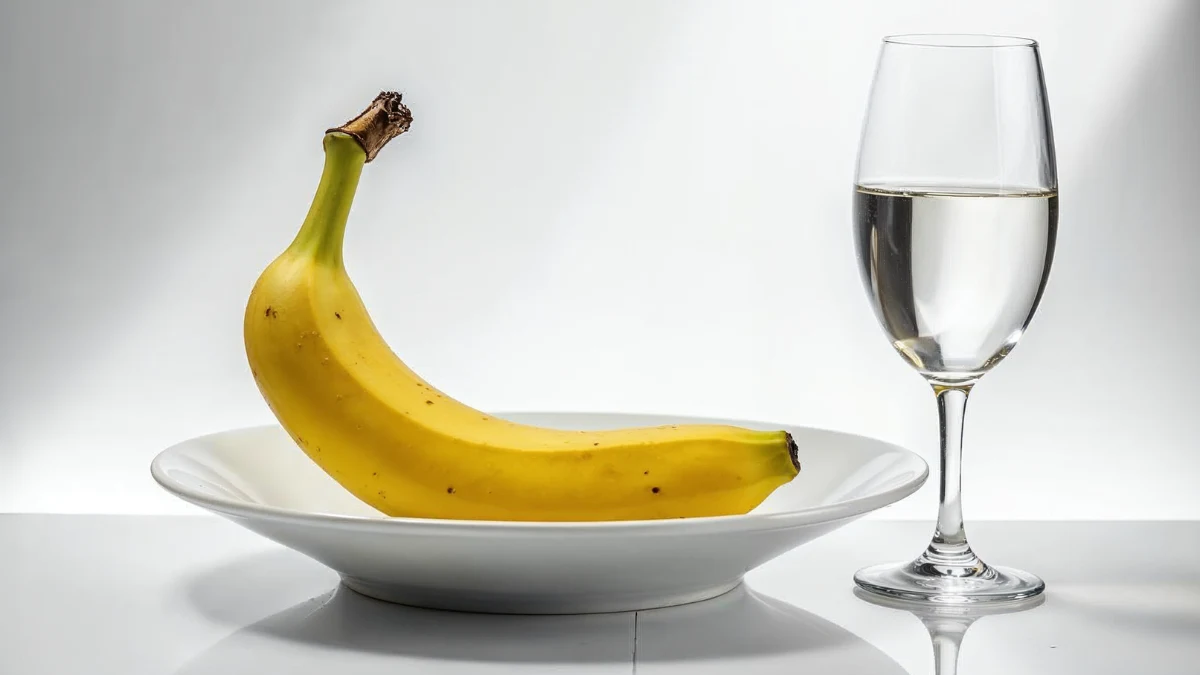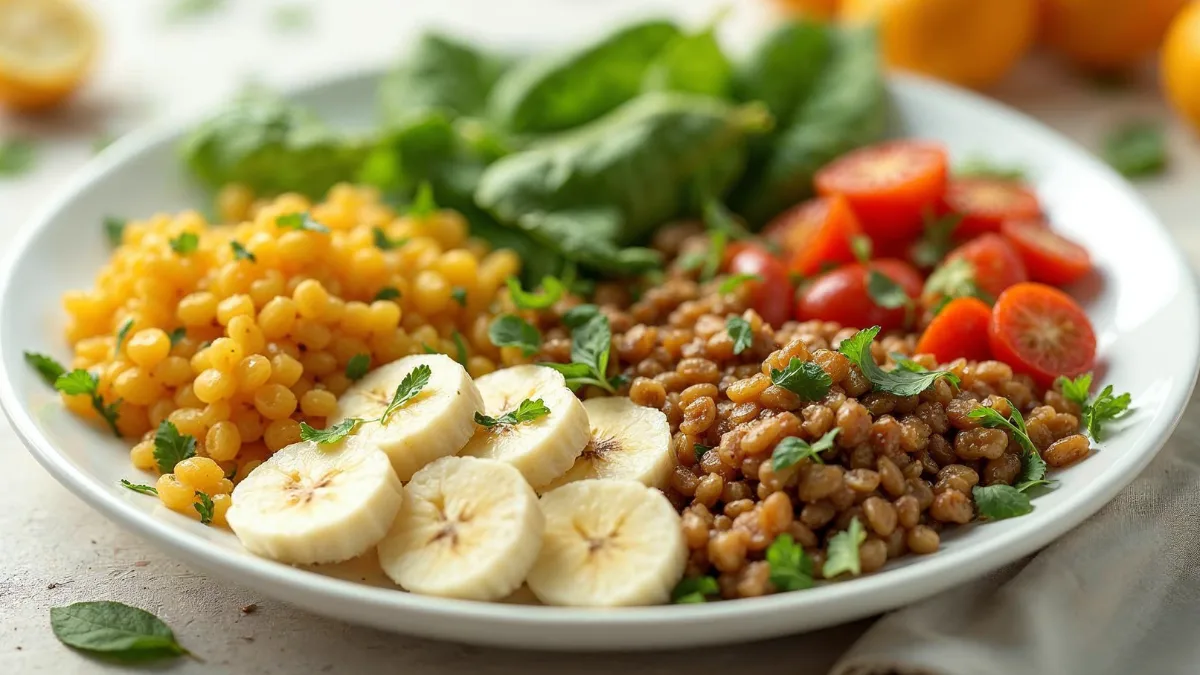The Banana Diet focuses on three essential ingredients: bananas, water, and meal timing. This simple yet effective diet plan has gained popularity due to its easy-to-follow structure and natural benefits. By incorporating bananas into your daily routine, staying hydrated, and following a structured meal schedule, many have found success in managing weight, boosting energy, and improving digestion.

In the following sections, we’ll explore how each of these three ingredients contributes to the Banana Diet’s effectiveness and how they work together to support overall health. From the nutritional power of bananas to the importance of hydration and meal timing, each element plays a key role in achieving the desired results.
What Are the Three Key Ingredients in the Banana Diet?
The Banana Diet revolves around three key ingredients: bananas, water, and meal timing. Bananas are the primary component, providing a natural source of energy, fiber, and essential nutrients like potassium and vitamin B6. These nutrients support digestion, heart health, and overall well-being.
Water is the second essential ingredient, helping to maintain hydration, flush toxins, and aid in digestion. Proper hydration supports the body’s metabolism and ensures that the nutrients from bananas are properly absorbed.
Meal timing is the third element. The Banana Diet emphasizes eating bananas in the morning and drinking water throughout the day, especially before and between meals. The goal is to avoid overeating by regulating meal times, particularly avoiding late-night eating, which can disrupt metabolism. Together, these ingredients form a balanced and effective approach to health and weight management.
Bananas: The Core of the Banana Diet
Bananas are the star ingredient in the Banana Diet, offering numerous health benefits that make them an ideal choice for this diet. Rich in essential nutrients such as potassium, vitamin B6, and vitamin C, bananas help maintain heart health, regulate blood pressure, and support the immune system. The potassium in bananas plays a vital role in fluid balance, muscle function, and nerve transmission, making them an essential part of the Banana Diet.
Moreover, bananas are an excellent source of dietary fiber, including both soluble and insoluble fiber. This fiber content promotes healthy digestion, supports regular bowel movements, and helps prevent constipation—further supporting the Banana Diet’s focus on digestive health. Additionally, the natural sugars in bananas—glucose, fructose, and sucrose—provide a quick and sustained energy boost without causing blood sugar spikes, making them an ideal energy source for those on the Banana Diet.
Bananas are also filling, helping to curb hunger and reduce cravings. This makes them an excellent choice for those on the Banana Diet who are seeking weight management and a healthy, balanced approach to nutrition. By incorporating bananas into the Banana Diet, you ensure both nourishment and satisfaction.
Banana Diet
Supports Digestion and Nutrient Absorption
Water is a crucial component of the Banana Diet, playing an essential role in supporting overall health and enhancing the diet’s effectiveness. Proper hydration helps optimize digestion, ensuring that the nutrients from bananas and other foods are absorbed efficiently. Water aids in the breakdown of food in the digestive system, preventing bloating and discomfort while promoting regular bowel movements.
Enhances Metabolism and Reduces Hunger
In addition to aiding digestion, staying hydrated supports metabolism, helping the body burn calories more efficiently. Water also flushes out toxins, reducing the risk of bloating and water retention. Drinking plenty of water throughout the day can help curb hunger and prevent overeating, as thirst is often mistaken for hunger.
The Banana Diet encourages drinking water consistently, particularly before and between meals, to enhance the benefits of bananas and keep the body functioning at its best. Hydration is key to maximizing the diet’s potential.
The Role of Water: Why Hydration Is Essential in the Banana Diet

Supporting Digestion and Metabolism with Water
Water is a crucial component of the Banana Diet, as it supports various bodily functions and enhances the diet’s effectiveness. Staying hydrated helps maintain a healthy metabolism, aids in digestion, and keeps you feeling full, preventing unnecessary snacking. Drinking water before and between meals can also help control portion sizes and prevent overeating, which is key for weight loss.
Reducing Bloating and Fluid Retention
The high potassium content in bananas works in synergy with water to balance sodium levels in the body, promoting better fluid retention and reducing bloating. This makes the Banana Diet particularly effective for individuals looking to reduce water retention and improve digestion. By staying hydrated throughout the day, you’re helping your body function at its best and maximizing the benefits of the Banana Diet. Make sure to drink plenty of water to enhance the results of your Banana Diet journey.
Meal Timing: How Eating at the Right Time Enhances the Banana Diet
Starting Your Day with Bananas
Meal timing plays a significant role in the Banana Diet, helping to optimize metabolism and support weight loss. The Banana Diet emphasizes eating bananas as the first meal of the day. Bananas are packed with essential ingredients such as fiber, potassium, and vitamins, providing a quick source of energy to kickstart your metabolism. The high fiber content in bananas also promotes feelings of fullness, reducing the likelihood of overeating later in the day. By starting your day with this simple and nutritious ingredient, the banana, you can ensure your Banana Diet is off to a strong start.
Avoiding Late-Night Eating
Another important aspect of the Banana Diet is avoiding late-night eating. Eating too close to bedtime can disrupt digestion and metabolism, potentially leading to weight gain. By sticking to a regular eating schedule and focusing on balanced meals that include key ingredients from the Banana Diet, such as bananas, the body can process food more efficiently.
Overall, aligning meal times with the body’s natural rhythms helps enhance the Banana Diet’s benefits. By incorporating the right ingredients at the right times, especially the banana, the Banana Diet supports both weight management and digestive health.
Overall, aligning meal times with the body’s natural rhythms helps enhance the Banana Diet‘s benefits, supporting both weight management and digestive health. By maintaining consistent meal timing, the Banana Diet can become even more effective in achieving your health goals.
How the Banana Diet Promotes Weight Loss and Health
Balancing Calories and Nutrients for Weight Loss
The Banana Diet promotes weight loss and overall health by focusing on nutrient-dense foods and simple meal timing. Bananas, the primary ingredient, are naturally low in calories but high in fiber and essential nutrients like potassium and vitamin B6. The fiber content in bananas helps control appetite by increasing feelings of fullness, making it easier to eat fewer calories throughout the day.
Supporting Digestion and Metabolism
By encouraging regular hydration with water, the Banana Diet aids in digestion and detoxification, further supporting weight loss. Water helps prevent bloating, supports metabolism, and reduces the likelihood of overeating by curbing hunger.
Additionally, the diet’s emphasis on eating early in the day and avoiding late-night meals helps regulate the body’s metabolism. This structured meal timing encourages efficient digestion and weight management, making the Banana Diet a balanced approach to both health and weight loss.
The Digestive Benefits of the Banana Diet
Promoting Healthy Digestion with Fiber
The Banana Diet offers significant digestive benefits, primarily due to the high fiber content found in bananas. Bananas contain both soluble and insoluble fiber, which play an essential role in promoting healthy digestion. Soluble fiber helps absorb water, forming a gel-like substance that slows digestion and promotes a feeling of fullness, while insoluble fiber adds bulk to stool, preventing constipation and supporting regular bowel movements. These digestive benefits are key elements of the Banana Diet’s overall health benefits.
Supporting Gut Health and Reducing Bloating
In addition to fiber, bananas in the Banana Diet contain prebiotics, which help nourish the beneficial bacteria in the gut, supporting overall gut health. These beneficial bacteria aid in the digestion of food and the absorption of nutrients. The high potassium content in bananas also helps reduce bloating by balancing sodium levels in the body, promoting healthy fluid retention. This digestive support is one of the primary reasons many people turn to the Banana Diet for a healthier gut.
With its combination of fiber, prebiotics, and potassium, the Banana Diet supports a healthy digestive system, improving overall gastrointestinal function.
Is the Banana Diet Sustainable? Pros and Cons

| Pros | Cons |
|---|---|
| Simple and Easy to Follow | Limited Food Variety |
| The Banana Diet is straightforward, requiring only a few basic foods—bananas, water, and structured meal timing. | The diet focuses mainly on bananas, which may lack sufficient variety in terms of other fruits, vegetables, and protein sources. |
| Supports Digestion and Weight Loss | Potential Nutrient Gaps |
| Bananas are rich in fiber, which helps regulate digestion and promotes weight loss by curbing hunger. | The diet may not provide all the necessary nutrients (like protein or healthy fats) in adequate amounts. |
| Encourages Healthy Habits | Restrictive for Long-Term Use |
| The focus on hydration and eating at specific times can encourage healthier eating habits. | Following such a restricted diet for a long period could lead to nutritional imbalances and boredom. |
| Affordable and Accessible | Possible Over-Reliance on Bananas |
| Bananas are inexpensive and widely available, making the diet cost-effective. | Relying too heavily on bananas could lead to an over-consumption of sugar and carbohydrates. |
Tips for Successfully Following the Banana Diet
Avoid Over-Reliance on Bananas
While bananas are rich in essential nutrients, consuming too many can lead to excess sugar intake. Ensure variety in your diet to maintain balanced nutrition.
Start Your Day with a Banana
Begin your morning with a banana to kickstart your metabolism and provide a natural energy boost. The fiber in the banana helps curb appetite and keeps you full until your next meal.
Stay Hydrated
Drink plenty of water throughout the day. This is essential for digestion, reducing bloating, and preventing overeating. Aim to drink a glass of water before and after meals.
Avoid Late-Night Snacking
Stick to a consistent meal schedule and avoid eating close to bedtime. Eating late can disrupt digestion and metabolism, making it harder to lose weight.
Balance Your Diet
While bananas are the core of the diet, make sure to include other nutrient-dense foods like vegetables, lean proteins, and whole grains in your meals to avoid nutrient gaps.
Listen to Your Body
Pay attention to your hunger signals. If you’re feeling unsatisfied or overly hungry, consider adjusting your portion sizes or adding more variety to your meals.
Combine with Physical Activity
For best results, pair the Banana Diet with regular exercise. Physical activity helps burn calories, boost metabolism, and improve digestion.
fAQs
What ingredients are in the Banana Diet?
The Banana Diet primarily consists of three key ingredients: bananas, water, and meal timing. Bananas serve as the main food, offering essential nutrients like potassium, fiber, and vitamins that support digestion, energy, and heart health. Water is crucial for hydration, helping to optimize metabolism, digestion, and prevent bloating. Meal timing is another important component, with an emphasis on eating bananas in the morning and drinking water consistently throughout the day, especially before and between meals.
What is the secret banana trick to lose weight?
The secret “banana trick” in the Banana Diet involves eating a banana as the first meal of the day, typically in the morning. Bananas are rich in fiber, which helps to promote satiety and curb hunger, reducing overall calorie intake. Their natural sugars provide an energy boost without causing a blood sugar spike. Additionally, the high potassium content in bananas helps balance sodium levels and reduce bloating, further supporting weight loss efforts.
What are the results of the 3-day Banana Diet?
The 3-day Banana Diet typically results in initial weight loss, primarily due to water loss and the reduced calorie intake from following a simple meal plan of bananas and water. Many individuals report feeling lighter, less bloated, and more energized during this short period. However, results can vary based on individual body types and metabolic rates. It’s important to note that while short-term weight loss is possible, long-term results require maintaining a balanced diet and healthy lifestyle.
How to eat banana to reduce belly fat?
To reduce belly fat with bananas, it’s important to incorporate them into a balanced diet alongside healthy lifestyle choices. Start your day by eating a banana in the morning, as it helps curb hunger and provides sustained energy throughout the day. Bananas are high in fiber, which aids digestion and keeps you feeling full longer, reducing the likelihood of overeating. Combine banana consumption with regular physical activity, such as cardio and strength training exercises, and stay hydrated with water to help maximize fat-burning and improve overall digestion.
Conclusion: Should You Try the Banana Diet for Your Health Goals?
The Banana Diet offers a simple, affordable, and effective approach to weight loss and overall health, primarily by focusing on three key elements: bananas, water, and meal timing. So, what ingredients are in the Banana Diet? By incorporating bananas into your daily routine, you benefit from their rich nutrient profile, including fiber, potassium, and vitamins that support digestion, energy levels, and heart health. Staying hydrated with water and following structured meal timing further enhances the Banana Diet’s effectiveness, promoting better digestion and preventing overeating.
However, like any diet, the Banana Diet may not be suitable for everyone. Its limited food variety and potential nutrient gaps can be a concern for long-term sustainability. To ensure balanced nutrition, it’s important to incorporate other healthy foods alongside bananas. Additionally, if you have any underlying health conditions, it’s advisable to consult a healthcare provider before starting the Banana Diet.
Ultimately, the Banana Diet can be a helpful tool for those looking to jumpstart healthier habits, lose weight, or improve digestion. If you’re looking for a simple, no-fuss diet plan, the Banana Diet might be worth trying—but it’s important to stay mindful of your overall nutritional needs and make adjustments as necessary. For a quick, delicious, and healthy treat to complement your new diet, you can check out this 3-ingredient banana recipe.




